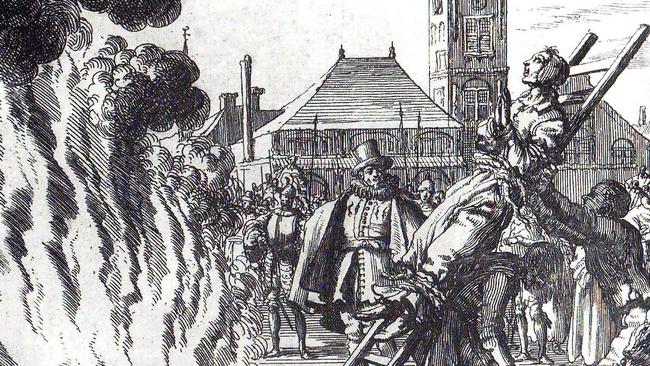Protestants: 500 years in 500 pages
In Protestants, Alex Ryrie writes with the affection of an insider and the judgment of a first-class historian.

In early 1534, the kingdom of God came to the German city of Munster. Under the influence of a Dutch baker called Jan Matthys, the city’s leading figures converted en masse to Anabaptism, a radical Protestant creed that taught that the end of the world might be only days away.
To its neighbours, it seemed as if the city had gone mad. The exiled Catholic prince-bishop gathered an army and returned in force, but the Anabaptists were beyond reason.
On Easter Sunday Matthys, suffused with apocalyptic fervour, led a suicide mission beyond the walls and was killed. His head ended up on a pole, his genitals were nailed to the city gate. But Munster held out.
Matthys’s successor, a tailor called Jan Bockelson, proclaimed himself the heir of King David, announced the abolition of private property and began accumulating wives, 16 in all.
At last, in the summer of 1535, Munster fell to the besiegers. Bockelson and his friends were tortured, their bodies hung from poles by spiked collars, their tongues ripped out, their flesh torn apart with red-hot tongs. You can still see the iron cages in which their corpses were exhibited, hanging from the city’s cathedral tower.
In England where, for almost 500 years, Anglicanism has been the official creed of the monarchy, it is easy to forget how terrifyingly radical Protestantism once seemed. Yet Munster’s descent into anarchy was a vivid reminder of the extraordinary power of the movement personified by Martin Luther, John Calvin and their successors.
In essence, contends Alec Ryrie in Protestants: The Radicals Who Made the Modern World, Protestantism is an “ill-disciplined argument” that has raged since Luther first denounced his local archbishop’s financial corruption.
For Ryrie, Protestantism’s driving force has always been this spirit of free inquiry, often unruly but always restless. At its heart, he thinks, has always been the idea of love, specifically the experience of God’s love.
To cover the story of Protestantism in 5oo pages may seem a reckless task. But Ryrie, a church history professor at Durham University, has succeeded magnificently. A lay preacher in the Church of England, he writes with the affection of an insider and the judgment of a first-class historian, and is excellent at conveying the excitement, passion and violence that have marked Protestantism’s story.
There always have been radicals, heretics and freethinkers, of course. But Ryrie shows that Protestantism emerged at a particular time, when the development of print culture was shaking authority all over Europe.
Although historians still quarrel about what Protestantism means, Ryrie prefers what he calls a simple “genealogical” definition:
Protestants are Christians whose religion derives ultimately from Martin Luther’s rebellion against the Catholic Church. They are a tree with many tangled branches but a single trunk.
From the beginning, this was not merely a religious movement but a political one. And partly because it was so political, it was accompanied by extreme violence, with Protestants usually cast as the victims. In France, its surge in the 1560s was checked only by an orgy of bloodshed, with thousands murdered in the St Bartholomew’s Day Massacre in 1572.
It was fear of such brutality, Ryrie suggests, that inspired one of Protestantism’s most impressive legacies, its acceptance of pluralism.
By and large, the early Protestants did not enjoy being tolerant, but they did it for fear of something worse.
Civil servant and poet Andrew Marvell may have deplored the tolerant public culture of “Amsterdam, Turk-Christian-Pagan-Jew / Staple of sects and mint of schism”, but the civil wars of the 1640s had taught his boss, Oliver Cromwell, that it was safest to allow a little dissidence.
For Ryrie, Cromwell was “the first Protestant leader anywhere to support religious toleration as a matter of principle”. It was Cromwell, after all, who invited Jews back to England after centuries of exclusion. He once said that he would have accepted Muslims, too, if any had wanted to come.
The obvious difficulty of writing about Protestants is that there are so many different kinds. Appropriately enough, however, Ryrie is an impressively tolerant narrator. Ranters and Quakers, Pietists and Methodists, they all get a fair hearing.
And although he writes with a keen sense of irony, he never descends into cheap mockery. He is generous, for example, to the leaders of the Adventist movement, who told their American followers that the end of the world was scheduled for October 22, 1842, only to be embarrassed when the following day (the “Great Disappointment”) dawned as normal.
Modern Protestantism is, of course, a global phenomenon: as Ryrie shows, the most dramatic growth has occurred in countries such as China and South Korea, as well as Latin America, where Pentecostalism’s emphasis on the individual’s unique, private relationship with God has proved enormously successful. We still think of Latin Americans as devout Catholics, yet one in four Brazilians and almost half of Central Americans are Pentecostal Protestants.
Perhaps their wildly ecstatic rituals would strike Luther and Calvin as shocking or absurd. Yet Ryrie thinks the Protestant experience remains at heart “the same old love affair: a direct encounter with God’s power, whether as a lived experience, a memory, or a hope”.
More than any other version of Christianity, Protestantism holds out the promise of individual and social change.
And as this learned, humane and entertaining book suggests, the appeal of that promise will surely never wane.
Dominic Sandbrook is a historian and author.
THE SUNDAY TIMES
***
Protestants: The Radicals Who Made the Modern World
By Alec Ryrie
Published in Australia next month by HarperCollins, 528pp, $54.99 (HB


